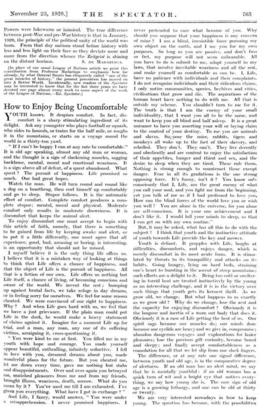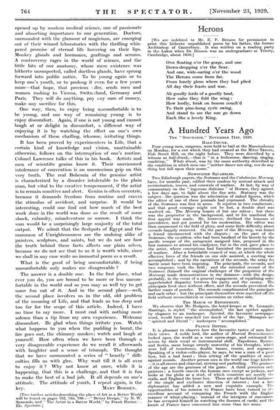How to Enjoy Being Uncomfortable
yOUTH knows. It despises comfort. In fact, dis- comfort is a sharp stimulating ingredient of its delight. Ask any youngster who plays football or squash, who rides to hounds, or trains for the half mile, or roughs it in the mountains, or starts on a voyage round the world in a thirty-ton yawl.
" If I can't be happy I .can at any rate be -comfortable." It is old age speaking, almost any old man or woman, and the thought is a sign of slackening muscles, sagging backbone, mental, moral and emotional weariness. It is a sign above all of defeat, of a quest abandoned. What quest ? The pursuit of happiness. Life promised so much. One had great hopes.
Watch the man. He will turn round and round like a dog on a hearthrug, then curl himself up comfortably and go to sleep. Stupor follows. It is the automatic effect of comfort. Complete comfort produces a com- plete stupor; mental, moral and physical. Moderate comfort only results in moderate drowsiness. It is discomfort that keeps the animal alert.
To enjoy discomfort one must accept to begin with this article of faith, namely, that there is something to be gained from life by keeping awake and alert, or to -put it a little differently, one must agree that all experience, good, bad, amusing or boring, is interesting, is an opportunity that should not be missed.
I myself believe it is the only thing life offers us. I believe that it is a mistaken way of looking at things to think that Life offers a chance of happiness, and that the object of Life is the pursuit of happiness. All that is a fiction of our own. Life offers us nothing but Life itself, a chance of living, of becoming conscious and aware of the world. We invent the rest ; bumping up against brutal facts, we take refuge in day dreams, or in feeling sorry for ourselves. We feel for some reason cheated. We were convinced of our right to happiness. Why ? And when Life goes hard with us, we feel that we have a just grievance. If the plain man could put Life in the dock, he would make a heavy statement of claims against it. Imagine for a moment Life up for trial, and a mart, any man, any one of -its suffering victims, arraigning it, -cross-questioning it.
" You were kind to me at first. You filled me in my youth with hope and courage. You made yourself appear beautiful, enthralling, infinitely seductive. I fell in love with you, dreamed dreams about you, made wonderful plans for the future. But you cheated me, let me down every time, gave me nothing but stabs and disappointments. Over and over again you betrayed me, snatched pleasures from me and from my friends, brought illness, weariness, death, sorrow. What do you mean by it ? You've used me till I am exhausted. I've given you everything. What have I got in exchange " And Life, I fancy, would answer, " You were under a misapprehension. I never promised happiness. I never pretended to care what became of you. Why should you suppose that your happiness is any concern of mine ? I am a blind, irresistible force pursuing my own object on the earth, and I use you for my own purposes. So long as you are passive, and don't fuss or fret, my purpose will not seem unbearable. All you have to do is submit to me, adapt yourself to my laws, that involve inevitable weariness and all the rest, and make yourself as comfortable as can be. I, Life, have no patience with individuals and their complaints. I do not recognize individuals and their ridiculous claims. I only notice communities, species, beehives and cities, civilisations that grow and die. The aspirations of the human heart have nothing to do with me. All that is outside my scheme. You shouldn't turn to me for it. The truth is that I am the enemy of your small individuality, that I want you all to be the same, and want to keep you all blind and half asleep. It is a great nuisance to have you asserting your will or laying claim to the control of your destiny. To me you are animals and slaves. Suz:pose the mice, -rabbits, tigers and monkeys all woke up to the fact of their slavery, and rebelled. They don't. They can't. They live decently and obediently and are content to enjoy the satisfaction of their appetites, hunger and thirst and sex, and the desire to sleep when they are tired. These rule them. Nothing is strong enough to counteract these except danger. Fear in all its gradations is the one strong opposing force. It's funny, isn't it ? You know sub- consciously that I, Life, am the great enemy of what you call your soul, and you fight me from the beginning, yet you talk of me as if I had professed to love you. How can the blind forces of the world love you or wish you well ? You are alone in the universe, for you alone are self-conscious. It is your one achievement and I don't like it. I would lull your minds to sleep, so that I can get on with my own routine."
But, it may be asked, what has all this to do with the subject ? I think that youth and the instinctive attitude of youth towards Life provide the key and answer.
Youth is defiant. It grapples with Life, laughs at difficulties, discomforts, and enjoys danger, which is merely discomfort in its most acute form. It is stimu- lated by threats to its tranquillity and attacks on its habits. Going hungry, lying on hard beds, straining one's heart to bursting in the ascent. of steep mountains; such efforts are a delight to it. Being too cold or swelter- ing in torrid heat are treated instinctively by the young as an interesting challenge, and it is. in the victory over such things that youth gets its keenest thrill. As we . grow old, we change. But what happens to us exactly as we grow old ? Why do we change, lose the zest and the capacity for enjoying discomfort ? Obviously it is the langour and inertia of a worn out body that does it. Obviously it is a case of Life getting the best of us. Our spirit sags because our muscles do; our minds doze because our eyelids are heavy and we give in, compromise; abandon dangerous voyages and explorations for lazier pleasures; lose the precious gift curiosity, become bored and sleepy; and finally accept comfortableness as a consolation for all that we let slip from our slack fingers.
The difference, or at any rate one signal difference, between youth and old age, is in the comparative degree of alertness. If an old man has an alert mind, we say that he is mentally youthful : if an old woman has a. quick turn of wit and a bright eye that notices every- thing, "KT say how young she is. The sure sign of old age is a growing lethargy, and one can be old at thirty or twenty.
We are very interested nowadays in how to keep young. The question has become, with the possibilities opened up by modern medical science, one of passionate and absorbing importance to our generation. Doctors, surrounded with the glamour of magicians, arc emerging out of their wizard laboratories with the thrilling whis- pered promise of eternal life hovering on their lips. Monkey glands and hormones, graftings and serums. A controversy rages in the world of science, and the little bits of our anatomy, whose mere existence was hitherto unsuspected, called ductless glands, have sprung forward into public notice. To be young again or to keep one's youth, or to prolong it even for a few years more—that hope, that precious c,ffer, sends men and women rushing to Vienna, Switzerland, Germany and Paris. They will do anything, pay any sum of money, make any sacrifice for this.
One way, then, to enjoy being uncomfortable is to be young, and one way of remaining young is to enjoy discomfort. Again, if one is not young and cannot laugh at or delight in discomfort, a different way of enjoying it is by watching the effect on one's own mechanism of these chaffing, irksome, irritating things.
It has been proved by experimenters in Life, that a certain kind of knowledge and vision, unattainable otherwise, follows on the interruption of one's routine. Colonel Lawrence talks of this in his book. Artists and men of scientific genius know it. Their unreasoned intolerance of convention is an unconscious grip on this very truth. The real Bohemia of the genuine artist is characterized by a disorder intolerable to the plain man, but vital to the creative temperament, if the artist is to remain sensitive and alert. Genius is often eccentric, because it demands freedom from routine and craves the stimulus of accident, and surprise. It would be interesting, could, one find out how much of the best work done in the world was done as the result of some shock, calamity, misadventure or sorrow. I think the sum would be a surprisingly large majority of the total output. We admit that the fleshpots of Egypt and the mammon of Unrighteousness are the undoing alike of painters, sculptors, and saints, but we do not see how the truth behind these facts affects our plain selves, because we do not see that to us it is worth while, since we shall in any case write no immortal poem as a result.
What is the good of being uncomfortable, if being uncomfortable only makes me disagreeable ?
The answer is a double one. In the first place, what ever you do, you are bound to be more or less uncom- fortable in the world and so you may as well try to get some fun out of it. And in the second place—well, the second place involves us in the old, old problem of the meaning of Life, and that leads us too deep and too far for the scope of this article. Indeed, I have no time to say more. I must end with nothing more solemn than a tip from my own experience. Welcome discomfort. Be glad when things irritate you. Watch what happens to you when the pudding is burnt, the fire goes out, the chimney smokes; watch and laugh at yourself. How often when we have been through a; very disagreeable experience do we recall it afterwards with laughter and a sense of triumph. The thought that we have surmounted a series of " beastly " diffi- culties fills us with glee. Why wait till it is all over to enjoy it ? Why not know at once, while it is happening, that this is a challenge, and that it is fun to make the best of a bad job. It all depends on one's attitude. The attitude of youth, I repeat again, is the [Two further articles describing the place of Art in a Better World will be found on pages 792, 795, 796 :—" Setter Design," by B. W. Symonds, and " The Artist- in a Better World,"- by Frank Rutter:— ED. Spectator.]































































 Previous page
Previous page